Connection
Service / Interaction
“The Government Records Service (GRS) will continue to leverage technology in its future public services and programmes to meet users’ needs.”
In addition to “discovery” and “preservation” of valuable records, the archivists have also been actively organising various public programmes to enhance public awareness of archives and promote the importance of documentary heritage. Archivist Mr Bernard Hui Sung-tak and Senior Assistant Archivist Ms Emily Yuen Sau-ming would like to share some experiences in providing reference services to the public and organising public programmes with you.
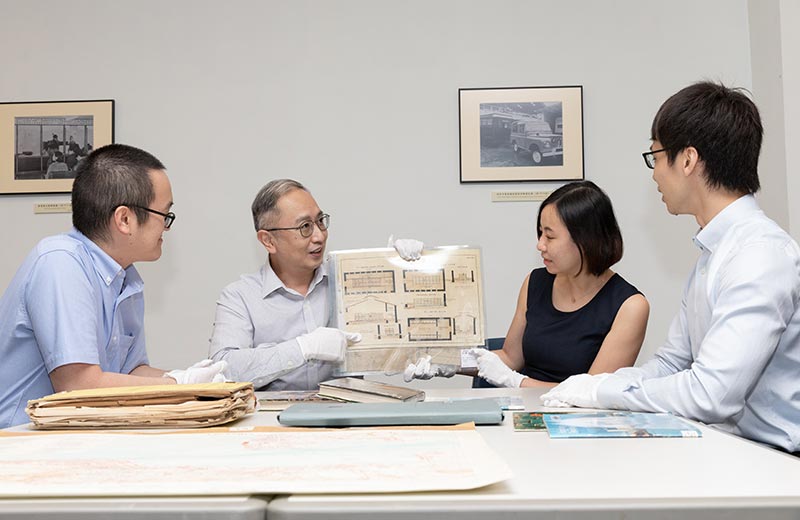
Users’ Needs Come First
Some may misunderstand that GRS’ holdings are only accessed by historians. “We have journalists collecting information for writing articles, lawyers inspecting land records to handle land transactions, and people tracing their ancestors’ footprints left in Hong Kong,” Mr Hui explained. “Archives indeed serve many different purposes.”
Meanwhile, will searching information from GRS’ 1.7 million archival holdings be like finding a needle in a haystack? Ms Yuen reassured, “With a people-oriented approach, our colleagues proactively reach out to users to understand their research interests and needs, and introduce them to the catalogue and finding aids, helping them formulate searching strategies and find their target collection and information.”
Ms Yuen has an experience to share. “One afternoon in 2018, an elderly woman from Australia visited GRS to search our holdings. She brought a family photo taken 69 years ago in Hong Kong, and wished to find out where the photo was shot and visit the place again. So we carefully studied the characteristics of the building in the background and compared the photo with our photo collections. Finally, we found out that place – the South Kowloon Magistracy. This Australian user was over the moon in thanking us. Later, she sent us a greeting card to appreciate our colleagues’ efforts of making her visit to Hong Kong meaningful.”
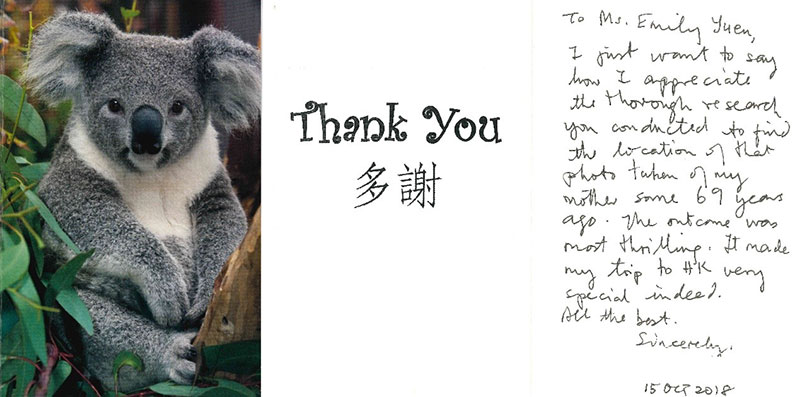
Providing reference services offers lots of opportunities to interact with well-known scholars visiting GRS. Mr Hui cherishes every one of them, “I use my knowledge of our holdings to help scholars search the information they need for their academic research. In return, many scholars share their research experience with me and enrich my understanding of Hong Kong’s history, even with a chit chat. These experiences are invaluable. We are also delighted to have some scholars’ acknowledgement in their research output.”
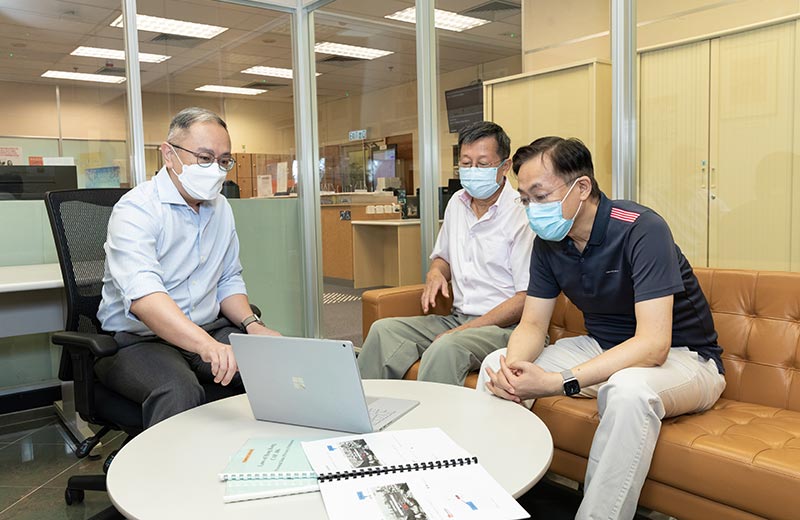
GRS’ colleagues are impressed by some regular users who visit us at a particular time every year. “Every summer holiday,” Mr Hui recalled, “an expatriate lady comes to access records which document her family members’ lives in pre-war Hong Kong. One day, she told us that she could travel to Hong Kong every year thanks to the benefit from the airline for which her husband worked as a pilot.” Helping users is of course an archivist’s joy, but more invaluable is to make friends with users through interaction.
GRS also surveys users’ expectation to improve its services. Some users indicated their difficulties in using GRS’ on-site services on weekdays, and suggested extending the opening hours of the Search Room to Saturdays. To serve more members of the public, GRS has been opening the Search Room for users to access our holdings on Saturday mornings by appointment since 2019.
Display and Engage
Mr Hui is aware of the growing public interest in archives in recent years. Not everyone has specific topics to study, however. The exhibitions organised by GRS over the years can meet their demand. “Our exhibitions cover many different themes,” Mr Hui added, “such as district development, housing projects, history of government departments, etc.” GRS also goes virtual – it presents online exhibitions to display a wide variety of precious holdings.
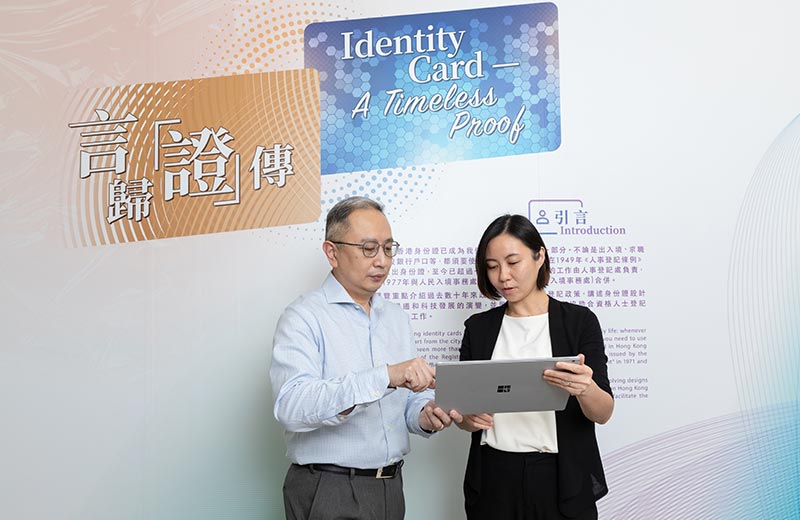
The exhibitions also show the public the value of archives. Have you ever imagined that the land use recorded in rates collection books can help us make sense of the landscape of individual areas in the past? Are you aware that the photos in traffic survey records indeed help preserve street scenes, building features, and ordinary living? GRS’ exhibitions show the possibilities of archival research to the public.
Collective memories belong to everyone. So GRS has tried to engage the public in its exhibitions in recent years. “For the very first time, we included the element of public engagement in our thematic exhibition ‘Pleasure and Leisure: A Glimpse of Children’s Pastimes in Hong Kong’ in 2019.” Ms Yuen added. “We invited people from all walks of life to contribute photos about their childhood play times and popular toys in those days to share their precious childhood with the public. As the programme was well received, a similar approach was adopted again in our next thematic exhibition ‘Folk Festivals in Those Days…’. We displayed precious exhibits borrowed from local organisations or community groups to reminisce about the collective memories.”
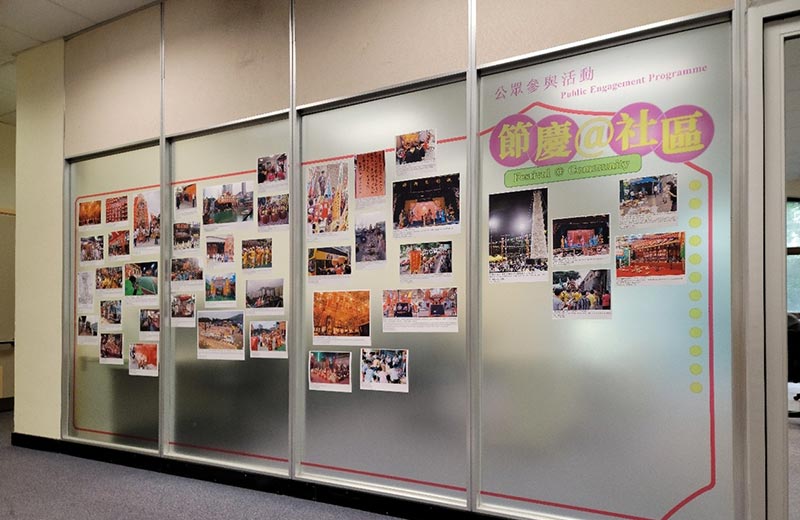
Outreach in the Digital Age
Rapid advancement in information technology has brought new opportunities to all sectors of business. In recent years, GRS has also introduced new technologies and services to enable the public to appreciate Hong Kong’s rich documentary heritage in an innovative way.
“Nowadays, many organisations connect and communicate with the public through social media, and GRS is no exception,” Mr Hui explained. “We launched the Public Records Office’s Facebook page in 2020 for the best of two words: we share our holdings with the public, and the public can let us know their views.” Ms Yuen added, “We shared two videos on the Facebook page when the thematic exhibition ‘Identity Card – A Timeless Proof’ was staged in 2021. The first one is a behind-the-scene video showing our preparation for the exhibition. The other one features ‘Dr Mo’, an animated character we designed, to take audience on a time-travel journey to trace the history of identity cards.”
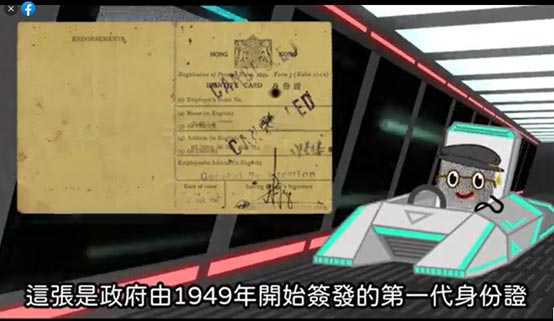
GRS recognises that working with different stakeholders and bringing archives into everyday life are essential to promoting documentary heritage to all walks of life. Ms Yuen explained, “To encourage students to learn about archives and use them for their studies, we attach great importance to cooperate with the education sector. Besides inviting schools to join our animated online workshop, we have also co-organised online professional training programmes for teachers with the Education Bureau. Teachers can learn about the ways of using archives. We in turn encourage them to include GRS’ services and holdings in their teaching so as to increase students’ knowledge and interest in archives. We will continue to work closely with the education sector in this aspect.”
In addition, GRS welcomes site visits from schools and other organisations. It has also organised online group visits in recent years. Saving the travel time, schools and organisations can arrange for the activities more flexibly. Mr Hui added, “In the past, members of the public had to visit GRS in person to access our holdings, or pay by ‘traditional’ ways for their reproduction copies. Today, they can obtain the digital copies of their ordered holdings via email at home simply by filling in an application form and making e-payment. These services were unimaginable before information technology was advanced enough.”
Archivists will continue to make the best use of technology to meet the users’ different needs in delivering public services and show the value of documentary heritage to the public through more diversified activities – all for connecting the public with our holdings.